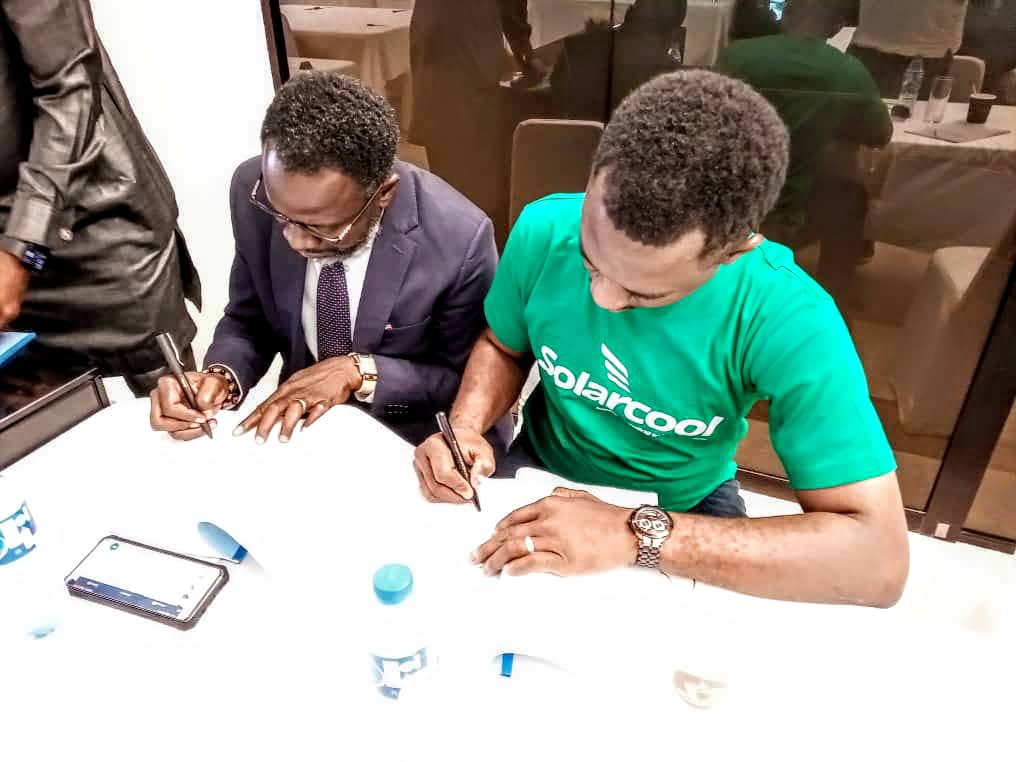Abuja, Nigeria – On June 2, 2023, the Rural Electrification Agency (REA) led by Ahmad Salihijo Ahmad, the MD/CEO of REA, along with Abba Aliyu, Head of the NEP Programme, and Barka Sajou, REA’s Executive Director of Technical Services, signed grant agreements with Energy Access Companies (EACs). The agreements were made under the African Development Bank (AfDB) component for NEP AfDB Productive Use Appliances & Equipment result-based financing, aimed at activating the energy-efficient productive use appliance and equipment market.
Solarcool signed the agreement to deploy 5 smart cold hubs and 200 smart fridges/freezers on a Cooling as a Service in five states in Nigeria. Solarcool’s technology plays a crucial role in combating food and vaccine waste in places in Africa without access to electricity. By leveraging solar energy, SolarCool reduces food waste, enhances food security, and operates independently from the grid, aligning with the goal of circularity through the Productive Use of Energy.
The Results-Based Financing for Productive Appliances & Equipment focuses on promoting the productive use of energy in remote communities by expanding access to efficient electric equipment. The initiative aims to power 24,500 Micro, Small, and Medium Enterprises (MSMEs) and provide improved energy services to 1,050,000 individuals through productive use systems.
SolarCool’s participation in the program is part of the energy-efficient productive use subsidy, which encourages the adoption of affordable appliances in underserved and unserved communities. The objective is to enhance rural productivity, foster economic growth, and create employment opportunities. SolarCool’s vision for the next five years is to strategically deploy 300 smart cold storage units across Africa to reduce and prevent food loss and waste in the agricultural value chain.

Speaking about the initiative, Ahmad Salihijo Ahmad, the MD/CEO of REA, emphasized the transformative impact of productive use of energy in previously underserved communities. Through the Nigeria Electrification Project (NEP) and with support from the African Development Bank Group, REA is dedicated to catalyzing the market for Productive Use Equipment and Appliances in the off-grid renewable energy sector. The signing of grant agreements with prominent energy access companies marks an important milestone in this endeavour. Ahmad encouraged all participating companies to continue exploring innovative energy access products while collaborating with REA to achieve the program’s objectives.
Nigeria imports about 60% of its wheat, it imports 30% of its fish and poultry consumption. The lands are not growing and expanding while the population is. It’s gotten to a point where if we don’t do something now to farm sustainably and be able to preserve our produce, we will have a crisis in a short time. In 2019 Nigeria
imported about 5.6 billion dollars of food alone and yet we lack forex to trade.
“Without cold storage, farmers are forced to sell their produce for much less than the market value because
they don’t have adequate means of preserving it,” says Chris. This is especially pertinent to mitigating the
millions of tons of food that goes to waste every year.
The African Development Bank, represented by its country manager, expressed its commitment to creating a robust, efficient, and sustainable fintech ecosystem across the continent. Recognizing the importance of energy access, the bank is accelerating the delivery of its High 5 strategic priorities through innovative interventions.
The signing of grant agreements between the REA and Energy Access Companies is a significant step towards promoting productive use of energy and fostering sustainable development in Nigeria and beyond. It represents a collaborative effort to bring about positive change and empower communities through increased access to reliable and efficient energy services.



1 Comments
Jon
Congratulation. Thanks for your services in promoting Sustainability